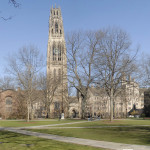by Haylee Kushi (Staff Writer, Native Hawaiian)
In 1990, the United States federal government tacked Pacific Islanders onto its census designation “Asian American or Pacific Islander.” This semester, the Yale Native American Cultural Center (NACC) welcomes its first staff member of Pacific Islander heritage, Assistant Director Kapi’olani Laronal (Haida, Tsimpsian, and Native Hawaiian). This raises the puzzling question: are Pacific Islanders indigenous?
The NACC has not historically served Pacific Islander students, since Pacific Islanders are not Native Americans. Native Americans are peoples indigenous only to the mainland United States, excluding both Alaska Natives and Hawaiians. Some Pacific Islanders are from islands colonized and controlled by the United States, so they are native to land that is now called America, but not Native American.
Laronal identifies a cultural connection between Native Americans and Pacific Islanders: “There are specific and detailed identifications that connect us directly to our land or water,” she said in an interview. “This is found in our Creation stories, cultural beliefs, practices and the direct teachings of our elders.”
But are Pacific Islanders indigneous? Are they capital-N-Native? It’s complicated. Some see indigeneity as inextricably tied to settler colonialism. We say Native American to distinguish between the descendants of the original inhabitants of the land, and the descendants of those who arrived post-colonization. Yet not all Pacific Islands are under colonial control.
In general, the term “Pacific Islander” encompasses a broad range of islands—like Samoa, the Solomon Islands, Tonga, Papua New Guinea, Tuvalu, Fiji, Chuuk, and Hawaiʻi— and a broad range of peoples with vastly different cultures, histories, and political situations. Some Pacific Islanders are native to lands colonized and controlled by countries other than the United States. Some have won their independence, some have not. Some Pacific Islanders are inhabitants of sovereign island nations.
Despite the difficulties of identity and classification, Laronal understands that “the common tie between [Native Americans and Pacific Islanders] is the political relationships that we have held or continue to hold as sovereign nations with the United States, and other countries who have settled on our land.”
The new assistant director, who previously worked in a similar position at Dartmouth College, is a familiar face for students of the Yale Native community. “Kapiʻolani possesses that particular strain of warmth and optimism most commonly found in those who uphold the value of community above all else,” said Kodi Alvord ‘18, who met her at Dartmouth College’s 2014 powwow.
Laronal’s vision is to work closely with NACC dean Kelly Fayard (Poarch Band of Creek Indians) to provide direct services, resources, and programming to Yale Native and Pacific Islander students. She draws upon the critical need for raising awareness about Native Hawaiian and other Pacific Island nations, and core issues affecting the original peoples of these lands.



